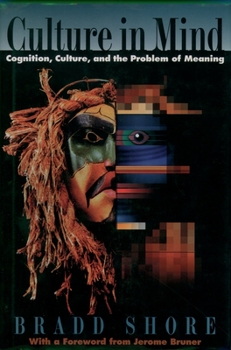Culture in Mind: Cognition, Culture, and the Problem of Meaning
Select Format
Select Condition 
Book Overview
In this exciting new book anthropologist Bradd Shore has created the first study linking multiculturalism to cognitive psychology, exploring the complex relationship between culture in public institutions and in mental representations.
Format:Hardcover
Language:English
ISBN:0195095979
ISBN13:9780195095975
Release Date:March 1996
Publisher:Oxford University Press
Length:448 Pages
Weight:1.85 lbs.
Dimensions:1.3" x 6.3" x 9.3"
Customer Reviews
1 rating
Utterly Fascinating Account of Culture
Published by Thriftbooks.com User , 18 years ago
Shore's Culture in Mind remains at the forefront of cognitive anthropology. His sophisticated development of schema theory (a.k.a. cultural models) clarifies the manner by which individuals create meaning, a process Shore entitles "epistemogenesis." In Shore's elaborate organization of schemas, he enables cultural theorists to preserve individual agency, the idiosyncratic creation of meaning by the person, within a relatively conservative account of cultural transmission. By adjusting the scale of analysis (from the individual scale of personal mental models, to the larger scale of conventional models, to the still larger scale of socially instituted models, to the largest scale of foundational schemas), Shore captures the nature of culture in mind--the manner by which a person gains her individual as well as her cultural understandings of the world, a thoroughly reciprocal process! This fruitful examination of schemas allows one to understand how the personal and idiosyncratic may exist simultaneously with the collective, social world. One of Shore's most interesting discussions is that of the "psychic unity of mankind" doctrine. This idea came about as a much needed response to the institutionalized racism of the 19th century, a trend as present in anthropology as elsewhere. But the cost of this doctrine, which would lead to the paradox of cultural relativism side-by-side with the assertion of universally similar human minds, became too great; a fact we all know from the rampant relativism of social theory in the later 20th century. Shore's elegant account of cognitive anthropology helps us undo this paradox by understanding how universally similar nervous systems, through a prolonged enculturation process--a process rife with the transmission of schemas and models--can be widely divergent in their representation of and engagement with the world. Shore addresses nearly every critique leveled against cognitive science in general, and cognitive anthropology in particular, as a means to make sense of "culture." This book is best read in conjunction with a study of the works of Roy D'Andrade, Dorothy Holland, Claudia Strauss, and Naomi Quinn. While Shore does a concise job of expressing his robust organization of schema theory, the sheer complexity of the ideas and their endless consequences require a careful--and repeated--review of the text. But the investment is worth it! A MUST READ for all students of culture.





